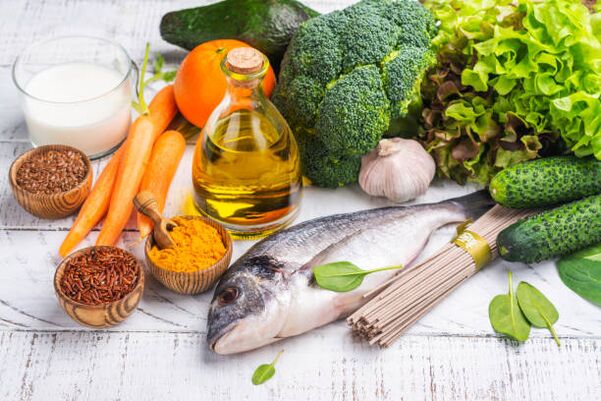The list of prohibited foods for psoriasis includes salt. Its consumption is limited because it not only stimulates the digestive tract, but also "attracts" water, leading to potential edema, weight gain, and deterioration of pathological processes in the metabolic process.
Spices and spicy dishes are excluded. In addition to their negative effects on the gastrointestinal tract and nervous system, they also have an adverse effect on the skin (aromatic substances and essential oils), causing skin itching and inflammation.
Digestible carbohydrates (sugar, honey, candy, etc. ) can also cause inflammation and can also lead to weight gain. It is necessary to exclude products containing preservatives, dyes, stabilizers and flavor enhancers: they can cause allergies and inflammatory reactions.
You should avoid eating greasy food, it will exacerbate lipid metabolism disorders, "increase" extra weight, and "inhibit" the work of the digestive tract.
List of prohibited items:
- Pastries, especially fresh pastries, white bread, and butter biscuits;
- Rich broth;
- Fatty meat (especially pork), lard, sausages;
- Smoked fish, meat, canned food;
- Condiments (garlic, horseradish, vinegar, pepper, cloves, nutmeg);
- Fatty dairy products;
- Citrus fruits (a controversial issue, some nutritionists welcome them, others ban them);
- Seafood (lobster, crab, shrimp, mussel, oyster);
- Highly allergic fruits and berries (strawberry, pineapple, melon, strawberry, blueberry, mango, cranberry);
- Vegetables (potatoes, tomatoes, pumpkins, beans, eggplants, sweet peppers);
- Coffee, cocoa, chocolate;
- Protein and butter, jam, honey, candy;
- Nuts, especially roasted and pickled;
- egg;
- Digestible grains (semolar, barley);
- Internal organs.
Need to follow a diet
Patients on a psoriasis diet will soon notice a significant improvement in skin condition, a decrease in recurrence frequency, and disappearance of itching and discomfort. In addition, nutritional therapy helps to normalize weight and digestive tract function, improve the appearance of hair and nails, and stimulate the immune system.
Why psoriasis needs a diet
After eating food, complex biochemical processes are triggered to break down and absorb food. The pH of the body depends on the composition of the food. When protein is metabolized in tomatoes, eggplants, meat, and fish, the environment becomes acidic. This is usually the trigger for the next recurrence of psoriasis. Therefore, eliminating such products will help avoid the characteristic pink patches covered with silver scales on the skin. Long-term adherence to the diet will lead to significant improvements in the body. How did this happen:
- Normalization of metabolism;
- The body's immunity to the influence of external and internal negative factors increases;
- Sleep quality improves, vitality increases, apathy and fatigue disappear.
There are certain allergic components in the pathogenesis (mechanism) of psoriasis. Even its symptoms are similar to typical signs of allergy-the skin can become inflamed, irritated and form a rash. Therefore, it is recommended to exclude foods that can cause allergies from the diet. For example, chocolate, strawberries, citrus fruits.
Healthy Food
For psoriasis, any fermented dairy product is useful, but it is low in fat. Nutritionists recommend that patients use non-flavored soft cheese, varenet, fermented baked milk, yogurt, and kefir more often. Children’s diet should definitely include cheese and drinking yogurt without dyes and spices. In addition, the following products should be included in the weekly menu:

- Boiled eggs or fried eggs;
- Lean meat-turkey, rabbit, chicken breast, lamb;
- Fatty fish-salmon, Norwegian herring, sardines;
- Dry whole wheat bread
- Cereal porridge-buckwheat, millet, wheat, corn;
- White cabbage salad, parsley beet, seasoning with any vegetable oil;
- Zucchini, vegetables and celery root, carrots.
Food must not be deep-fried or deep-fried. They should be simmered or baked with a little water. Steamed vegetables, meat or fish retain as many nutrients, macro and trace elements, fat-soluble and water-soluble vitamins as possible.
Nutritionists recommend eating fruits and dried fruits as desserts. Especially useful is the daily use of figs, dried apricots, pineapples, grapes, cherries, peaches, and dates. Among citrus fruits, only grapefruit is allowed. The dense skin of the fruit must be cut off. Don't forget nuts (walnuts, cashews, pistachios, hazelnuts), pumpkin and sunflower seeds. They alkalize the body perfectly, minimizing the risk of psoriasis recurrence.
Basic Nutrition Guide
The goals of the psoriasis diet are:
- Reduce the frequency of disease deterioration;
- Reduce the frequency and intensity of skin rashes;
- Normalization of metabolism;
- Stimulate the body's defenses;
- Improve the work of the digestive tract.
According to the classification, the diet of psoriasis does not have a "own table", which means to stick to the general diet or No. 15 treatment table.
If the disease worsens for a few days, it is recommended to adopt a low-calorie diet and mashed food. Its daily energy value is 1800 kcal, protein content-50-70 grams, fat-no more than 40-60 grams, carbohydrate-about 250-300 grams. The elimination of allergic foods is also shown.
Everyone's body is individual, so there are no clear restrictions on the consumption of specific foods. There are many mature diets for psoriasis, the most famous of which are the Pegano diet and the Fire diet. They are similar in that they try to regulate the acid-base balance in the body to stabilize the disease. In other words, it is recommended to consume up to 70% of alkali-forming products and about 30% of acid-forming products every day.
General principles of the psoriasis diet:
- Drinking liquids; daily free liquid intake should not be less than 2-2. 5 liters. Drinking plenty of water can remove toxins from the body, normalize kidney function, prevent constipation and increase skin plumpness.
- Weight; Being overweight indicates a deep metabolic disorder, especially lipids and carbohydrates. It is important to normalize weight, not overeating and exercise, because obesity can damage the digestive tract and cardiovascular system. Normalizing body weight can improve skin conditions because the level of C-reactive protein in the blood decreases, and as obesity increases, the level of C-reactive protein increases.























